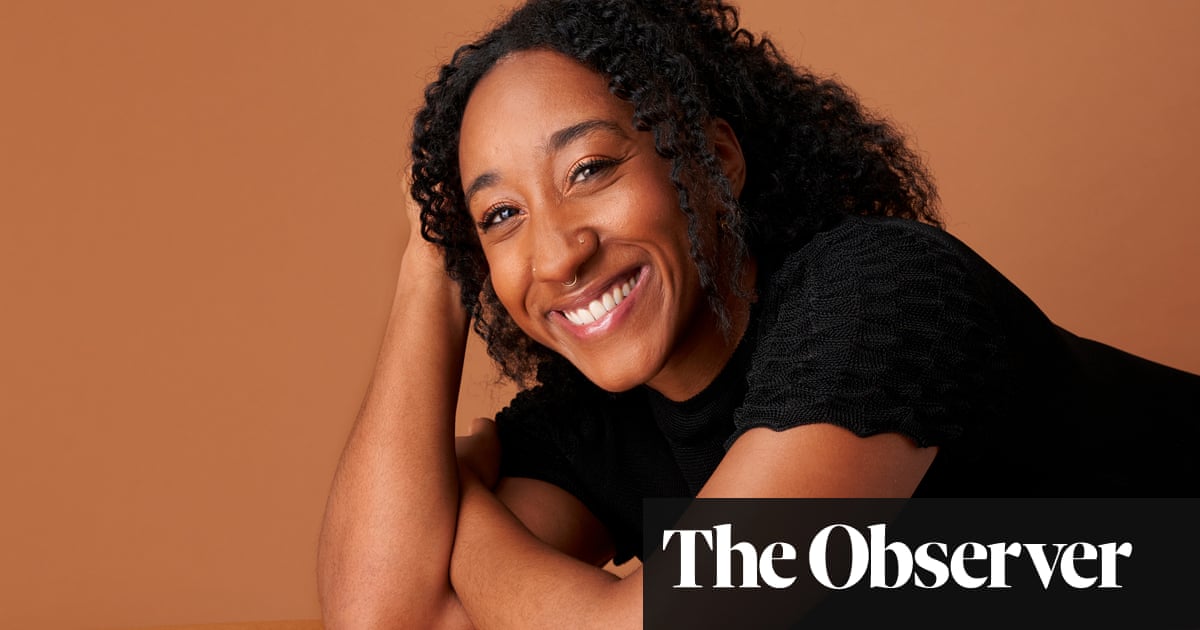Born in south east London in 1990, Jamilla Walters, AKA Jamz Supernova, is a broadcaster, DJ and boss of record label Future Bounce. In 2021, she became the presenter of BBC 6 Music’s Saturday early afternoon show, broadcasting global club sounds, alternative R&B and left-field electronica. A current Mercury music prize judge and part of the BBC’s presenting team at Glastonbury, she lives with her partner, music producer Sam Interface, and their two-year-old daughter.
You wanted to be a BBC presenter since your teens. Why?
I always thought of it as a trusted place as a kid, watching things from CBBC to Saturday morning TV. Then I came across BBC 1Xtra in the mid-2000s and heard the kind of radio they were doing – a bit closer to the old pirate-radio days, but not as commercial as places like Choice FM. I loved it – it felt like a place of freedom in terms of how you could be a presenter and where that could take you.
You worked there as a producer and a presenter before leaving for 6 Music, a station not known for having many black presenters. What was that like?
It was an interesting time. I’m glad I’m not the only black woman there [others at 6 Music include Afrodeutsche and Sherelle] and I never want to be “the first black woman to do this” anywhere, because that shouldn’t be a trophy. Things like that should have happened a lot quicker and sooner, especially when so much black music is being played in so many different shapes or forms across specialist stations.
Do you feel responsibility as a tastemaker?
I feel a duty to keep digging, go down wormholes online, make time for it, to not just go into my inbox, because that would be too easy. Emails come last! I don’t feel a responsibility to fit into the station, but I do feel the responsibility of having other young women who look like me, looking up to me. Now, they think of 6 Music as an option, and that’s a brilliant thing.
I also recently read that you love radio so much that you leave it on for your dog… is that true?
Yeah, we do! And sometimes it’s my voice, and that’s helpful for him [laughs]. Radio is company and comfort, isn’t it? It gives you the feeling that there’s always somebody there, even though there’s not. We saw that especially in lockdown. Even though playlists are great and algorithms have their place, people still want personal, human moments.
Female DJs are still paid less for gigs than men and face discrimination. Is anything changing for the better?
I think there is. I meet lots of women in my peer group, and of late I’ve been meeting women older than me – 55 and up – who have been running nights in their local area for years. Meeting them is just as exciting as meeting the next generation of DJs because I want to see what the future looks like.
What else could help women working in music?
We just have to keep on questioning and thinking about where there is the power to diversify. Like on the Glastonbury Pyramid stage – it makes headlines when they have two female headliners, like this year. We need more of that.
You learned your craft at the BRIT School. What are the biggest misconceptions about it?
That it’s this jazz hands, Fame-style, privileged place. It’s funded by the state. I think I’d have had impostor syndrome going anywhere else, but not there. They gave us this belief we could do it all, and that’s what we did. The amount of stuff we did was wild: I was producing outside broadcasts in my teens, in Croydon library with a big rig, with Katy B.
How have you and your partner found managing childcare around making music?
It makes time precious – having that half an hour before nursery to do her hair, to hope that the flight home won’t be delayed so I can see her. Before her, my partner and I could quite happily be in our own worlds working for hours. Now at six o’clock, we shut the laptop. She loves music too. She’s been making up songs and changing the lyrics to the theme tune to Waffle the Wonder Dog on CBeebies!
What do you do outside music to relax?
The gym, and to swim. There’s something about swimming that feels quite radical as a black woman with an afro. I used to be scared of it because I didn’t want my hair to frizz, but now I’ve got my big swimming hat. If my hair gets wet, it gets wet, we’ll deal with it. I wanted my daughter to see her mum as someone not scared of the water.
You’re about to host Glastonbury. What’s your favourite memory of it?
I think my favourite memory would be three Glastonburys ago – the first time that I actually worked there, not just as a DJ, but doing the radio and TV. From the DJ side of it, I’d always seen Glastonbury as a kind of debaucherous party where people didn’t sleep for five days. Being on the other side of it, being part of the cogs of what so many other people in the world see as Glastonbury, was magical.
Who are your new top music tips?
Bikôkô, who I’m putting out an EP with, makes a sort of hyperpop with lots of west-African influences, producing everything and playing it all live. Verito Asprilla from the Pacific side of Colombia because she can rap, man! And NIKS, a DJ who runs B.A.D – Black Artist Database – for black electronic artists, and makes brilliant music herself. All women, women, women. I’m very much into the feminine energy right now!

